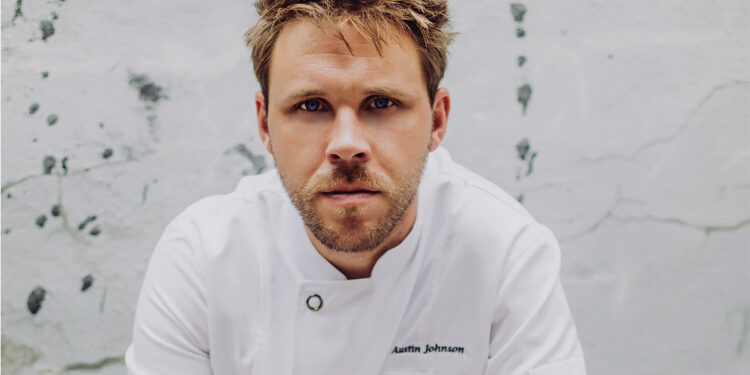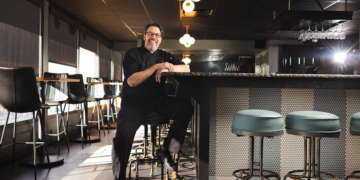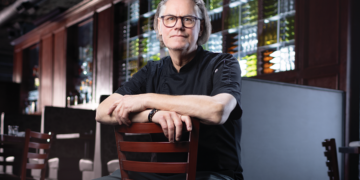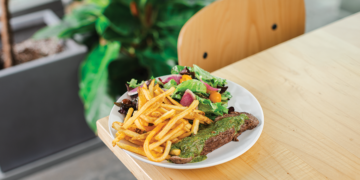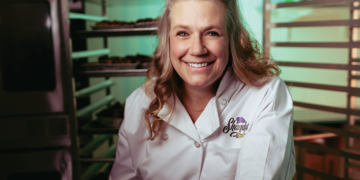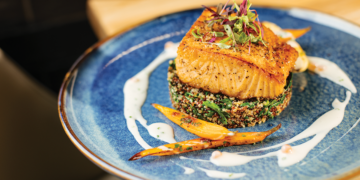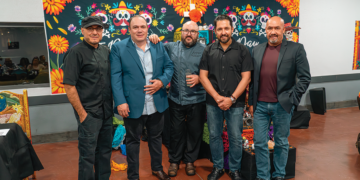Hums and honks filled the morning air as traffic inched through the heart of the largest city inbrAmerica.
b
Inside, Austin Johnson waited patiently. He’d traveled 3,000 miles and trained for years. Soonbrhe’d see if the greatest chef in this city would give him a job.br
b
Eventually that man appeared. In a Swiss accent, the chef with short brown hair told him hebrhad a test, handing him a piece of bass.br
b
The 23-year-old came recommended to Daniel Humm, head chef of Eleven Park Madison andbrrecipient of that year’s James Beard Award for Best Chef New York. But what Humm wanted tobrsee was if he could cook.br
b
“I’m like, ‘Holy fuck,’” Johnson remembered more than a decade later. “I’m in a three-starbrMichelin kitchen, big lights, white tablecloth on the pass and Daniel Humm is basically handingbrme a piece of fish for my future.”br
b
Johnson didn’t balk. He seared the Loup de Mer and plated it with poached parsnips andbrpears in front of Humm and the whole kitchen. He earned his spot.br
b
That experience, although elevated, was typical for Johnson’s life. For years he’d climbed hisbrway through the culinary world, working in kitchens across the country. A few years later he’dbrdo the same in Europe before returning to New York to start his own restaurant.br
b
But as the now-34-year old ponders what’s ahead during site walks of his soon-to-be venturebrin Tribeca, part of him always looks back. Toward home, the place it all started: Omaha.
b
“It’s a city that I’m always proud to say I was born and raised in,” said Johnson, “and I’d lovebrto come back and have a restaurant someday.”br
b
Johnson grew up on 168th and Q streets in a family that valued work ethic. Either go to collegebror make your own way. Johnson didn’t see how he fit into that picture. By the time he enteredbrMillard West High School during the turn of millennium, he felt aimless.br
b
“I don’t want to say he was lost, I think he just wasn’t very motivated,” said Kate Beiting, whobrtaught him as a high school freshman. “If you’re not interested in anything, why would youbrbe?”br
b
At 14, Johnson got a part-time job busing tables at the Back Nine Grill in West Omaha. As thebrTV broadcasted George Bush and Al Gore behind the bar, Johnson watched the kitchen. There,brline cooks cussed at each across the flat top as they sautéed vegetables and garnished thebrrims of plates with parsley. He’d never seen energy, excitement, and purpose like that. Hebrbegged the chef to teach him.br
b
b
br
br
br
The next few years Johnson consumed as much of the culinary world as Omaha had to offer,brworking at Biaggi’s, Buca di Beppo, the French Cafe, among others. During that time, he fed abrgrowing appetite for how to run a kitchen and make a dish great.br
b
At Millard West, he also spent most of his time cooking.br
b
Beiting, then the high school’s culinary teacher, had him in class from his sophomore to seniorbryears and took him and others to state and national culinary competitions.br
b
“I really saw that glimmer in his eye when he said, ‘You know, what if we did this, what if we dobrthat or have you ever done that?’” said Beiting, who retired in 2015. “It was magic.”br
b
As Johnson learned the basics of cooking, he learned the reality of working in a kitchen, wherebruniformity trumps sticking out. And as a young, scrawny kid working alongside career linebrcooks, Johnson stuck out.br
b
“These guys would burn me, these guys would try and break me down, they would put me inbrtears, they’d throw my fucking meat in the garbage,” he said. “Like who wants to cook with abr15-year-old kid? Not many people.”br
b
Beiting as well as his chefs encouraged him along the way as his skills matured. Eventually,brthey also told him to leave Omaha if he wanted to keep growing.br
b
At 20 he left for Indianapolis then Seattle, then New York, and took two trips on a commercialbrsalmon fishing boat up Alaska’s inner passage. It led him across the Atlantic to Noma inbrCopenhagen, then the best restaurant in the world, as well Oud Slous, a best-kept secret in abrsmall Danish village, and the Frenchie in Paris and London.br
b
Today in New York City he’s the executive chef of Goodman’s Bar, a refined spot in an upscalebrdepartment store on the southern edge of Central Park. In his new restaurant in Tribeca, thebrsame building where John Lennon and Yoko Ono once founded their own nation, even thebrvegetables are sourced from a 10-acre farm he owns in upstate New York.br
b
The standards for quality couldn’t be higher.
br“I’m going to be cooking harder the next five years than I ever have in my life,” he said.
brIt’s another step in his culinary progression, one where he always keeps an eye on Omaha.br
b
In the summers of 2017 and 2019, he hosted pop-up dinners at Block 16. Last year he invitedbrBeiting into the kitchen where she saw the realized talent of that 14-year-old kid in herbrhomeroom who didn’t seem to have a purpose.br
b
He hadn’t lost his affable Midwestern humility, either.br
b
“I would say, ‘Chef, what do you want me to do?’” Beiting said. “How do you want this?”br
b
“Do whatever you want,” she remembered him saying. “You’re the chef.”br
b
He might hover over plates with tiny spoons, finishing dishes with artful drizzles, dashes, orbrdollops, but he’s still pretty “Omaha” at heart.br
b
That’s why as he imagines the future, one idea materializes at the end of his bucket list.br
b
b
br
br
br
It’s a restaurant somewhere along a rough brick road in a market with open air patios and smallbrshops. It’s a place where his family and friends can experience the fine dining he’s spent yearsbrmastering.br
b
“I’d like to have a restaurant in San Francisco, I want to have a restaurant on a sailboat,” hebrsaid, “but at the end of the day it’d be cool to have a kick ass little restaurant in the Old Marketbrsomewhere and open the greatest little wine bar ever.”br
b
Follow @austininnyc on Instagram to learn more about Johnson.br
This article first appeared in the June 2020 issue of Omaha Magazine.

b
b
br
br


